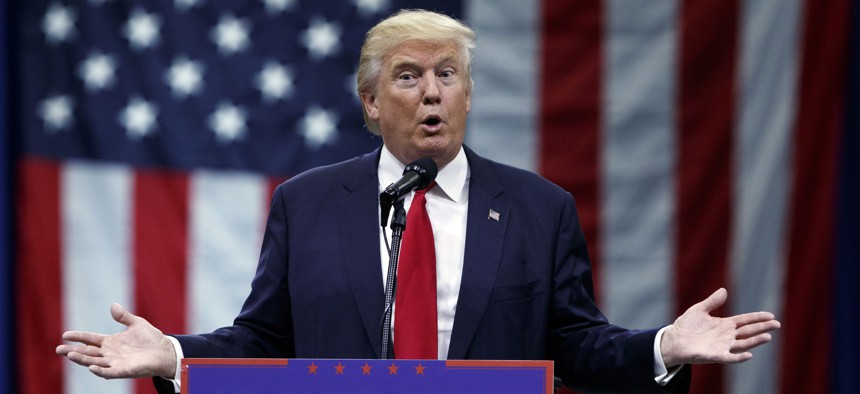Trump Calls for Over $500 Billion in U.S. Infrastructure Investment

GOP presidential nominee Donald Trump Evan Vucci / AP Photo

Connecting state and local government leaders
Without too many details, the Republican presidential nominee explains that his plan would be bigger than Hillary Clinton’s proposal.
Republican presidential nominee Donald J. Trump voiced support Tuesday for over $500 billion in new infrastructure spending, which would rely on bond financing.
Trump made his remarks during an interview on Fox Business Network. Democratic presidential nominee Hillary Clinton has outlined a $275 billion, five-year infrastructure plan. Asked about his rival’s proposal, Trump replied: “I would say at least double her numbers, and you’re going to really need more than that.”
Questioned about where that money might come from, Trump offered some explanation, but with scant details.
“We’ll get a fund,” he said. “We’ll make a phenomenal deal with the low interest rates.”
“People would put money into the fund. The citizens would put money into the fund,” he continued. “It’ll be a great investment and it’s gonna put a lot of people to work.”
Trump elaborated by saying that his infrastructure plan would involve selling bonds.
“We’d do infrastructure bonds, from the country, from the United States,” he said.
There’s widespread acknowledgement that America’s infrastructure is in need of upgrades.
Based on a Gallup poll from March, 75 percent of Americans agree the federal government should spend more on infrastructure. A May report from the American Society of Civil Engineers estimated the U.S. was on track during the coming decade to have a $1.44 trillion spending gap for surface transportation, ports and waterways, and water, wastewater and electricity systems.
At the Democratic National Convention last week, mayors from around the U.S. spoke at an event devoted to discussing the need for greater infrastructure investment.
But identifying revenue to pay for projects has proven to be difficult for elected leaders.
For example, Congress passed 36 short-term transportation funding extensions before finally settling on a five-year bill last December. Even that legislation, however, depends on one-time injections of money, and leaves questions about funding in future years.
Debates about how to pay for infrastructure commonly break along partisan lines. And Trump’s ambitious proposal would appear to be out of step with spending policies Republicans have commonly supported, which are typically characterized as more conservative.
During the interview with Fox Business Network on Tuesday, Trump also reiterated his vow to cut taxes if elected.
“I’m bringing taxes way down,” he said.
Bill Lucia is a Reporter for Government Executive’s Route Fifty and is based in Washington, D.C.

NEXT STORY: Government software in the cloud, now what?





